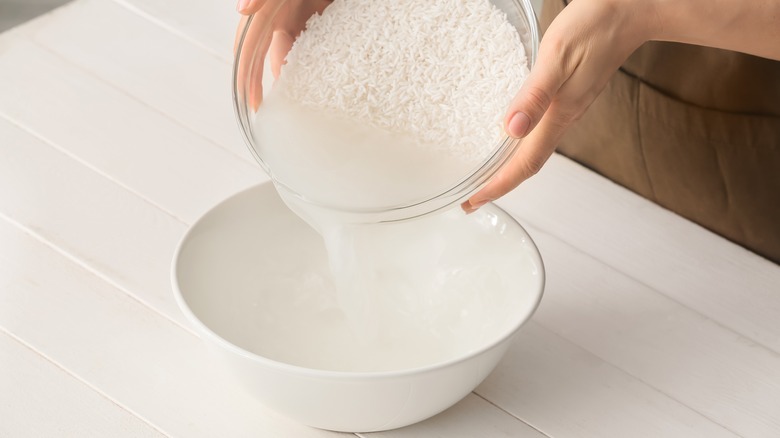Why You Should Start Saving The Water You Use To Rinse Rice
Rinsing rice is a practice worth considering when you're going for a fluffy finished product (as opposed to, say, when you're cooking arborio rice for a risotto). The reason is that most commercially available rice is milled, and the milling process, which causes starch granules to degrade, leaves rice with an excess of starchy residue on its surface (according to a 2011 academic paper published in the Journal of Agricultural and Food Chemistry). Rinsing the rice before cooking until the water runs clear removes that excess surface starch, which would otherwise become sticky after exposure to boiling water.
It's similar to what happens when you boil pasta — i.e., the noodles shed their excess starch into the cooking water. And like pasta, rice (as a general matter) should not be rinsed after cooking. If you do, you risk removing the remaining surface starch (as opposed to the excess), which is actually beneficial to your finished product. In fact, many pasta dishes benefit from adding a splash or so of the pasta water. By contrast, the cloudy rice water that remains after a good rinsing isn't known for benefitting your finished rice dishes. Nevertheless, that doesn't mean you should be tossing it out.
Indeed, like pasta water, rice water has a number of unexpected uses in cooking other dishes. And — also like pasta water –the water you use to rinse your rice may have a number of ingenious uses.
Rice water works magic in broths and fish dishes
Although rinsed rice water won't necessarily improve your rice dishes, there's evidence, not to mention logic, in support of using rice water to thicken broths and soups. Consider, for example, the sweet Japanese rice drink, amazake. Where does it get its thick texture? Why, that would be from rice starch. In addition, consider that rice, itself, is frequently used to thicken soups, not merely because rice, itself, adds heft and substance, but also because it releases starch as it cooks. In fact, if you're looking for the maximum starchy boost to your soup, consider using rice water from rinsing sushi rice, which — despite its sticky texture profile — benefits from a pre-cooking water bath.
In addition, Korean food blogger, JinJoo, recommends saving rice water for use in rinsing fish because it helps reduce the fishy smell (via Kimichari). In addition, salted fish can be made to taste somewhat less salty (as well as more tender) when given a 30-minute soak in the water left over from rinsing rice. That said, Jinjoo — as well as some Redditors commenting on the Korean Food subreddit – advise that for cooking purposes, you'll want to do an initial rinse or two before actually collecting the rice water. Although the specific reason isn't stated, it's presumably because the first rinse will most likely contain the heaviest concentration of starch, as well as any trace amounts of dust and heavy metals that are known to be found in rice.
The water you use to rinse rice has surprising uses around the house
The thought of using rice water for cleaning things around the house may seem counterintuitive. It's food, after all, and starch is a sticky substance. However, the water left over after rinsing rice is in wide use in China for precisely that purpose, according to Sabrina Wang — a blogger who resides in Vancouver, Canada but who spent a number of her formative years in China (via Apartment Therapy). Wang herself saves her rice water and uses it regularly to clean her kitchen countertops and appliances, as well as her dishes.
And now that Wang mentions it, it totally makes sense. Rice water is both slightly abrasive and mildly acidic — which, as a household product, puts it into the same category as many commercially available toilet bowl cleaners and products designed to remove mineral deposits, mold, and rust from surfaces. So, you may find it helpful when scrubbing dishes, sinks, and tubs. In addition, Australian lifestyle blogger Shannon Lush, swears by rice water as a fabric conditioner. She credits it with making her sheets and pillowcases feel like the fancy linens found in high-end hotels (via Daily Mail Online).
If you store it in the fridge, rice water should stay usable for about a week. But with so many uses around the kitchen, you're sure to use it up before then.


